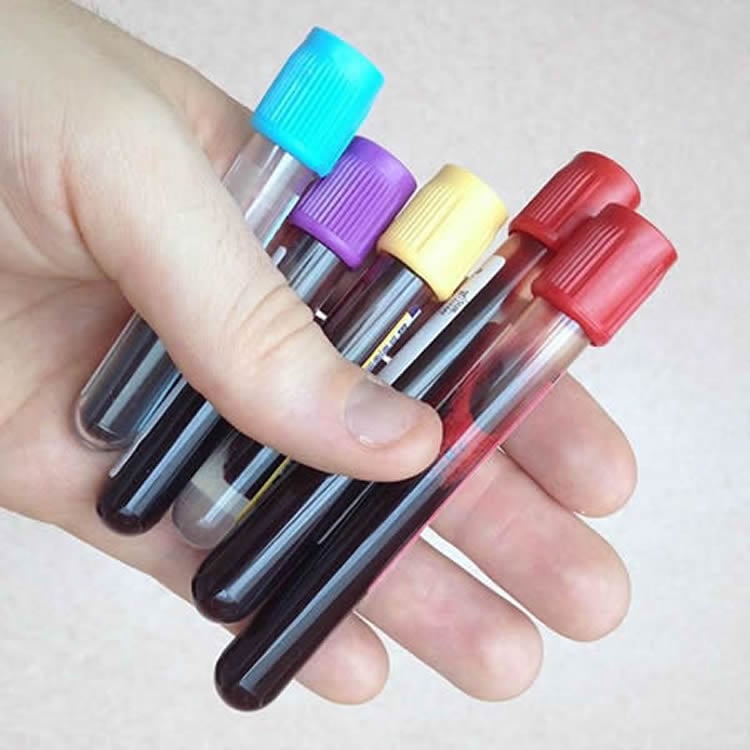Summary: A simple blood test can predict the onset of Alzheimer’s disease with 85 percent accuracy.
Source: Cardiff University.
Researchers predict onset of Alzheimer’s disease with 85 percent accuracy.
A research team, led by Cardiff University, has made a significant step towards the development of a simple blood test to predict the onset of Alzheimer’s disease.
Funded by the Alzheimer’s Society, the group of researchers from Cardiff University, King’s College London and the University of Oxford studied blood from 292 individuals with the earliest signs of memory impairment and found a set of biomarkers (indicators of disease) that predicted whether or not a given individual would develop Alzheimer’s disease.
Professor Paul Morgan, Director of Cardiff University’s Systems Immunity Research Institute, said: “Our research proves that it is possible to predict whether or not an individual with mild memory problems is likely to develop Alzheimer’s disease over the next few years. We hope to build on this in order to develop a simple blood test that can predict the likelihood of developing Alzheimer’s disease in older people with mild, and possibly innocent, memory impairment.”
The study took blood samples from individuals presenting with very common symptoms of memory impairment and measured a large number of proteins belonging to a part of the immune system which is known to drive inflammation and has previously been implicated in brain diseases. When the individuals were re-assessed a year later, about a quarter had progressed to Alzheimer’s disease and three of the proteins measured in their blood showed significant differences from the blood of participants that did not go on to develop the disease.
Professor Morgan added: “Alzheimer’s disease affects around 520,000 people in the UK and this number is continually growing as the population ages. As such it is important that we find new ways to diagnose the disease early, giving us a chance to investigate and instigate new treatments before irreversible damage is done.”

These new findings laid the groundwork for a much larger, ongoing study funded by the Wellcome Trust and involving several UK Universities and Pharmaceutical companies that will seek to replicate the findings and refine the test.
Funding: Funding provided by Wellcome Trust.
Source: Julia Short – Cardiff University
Image Source: This NeuroscienceNews.com image is in the public domain.
Original Research: Abstract for “Complement Biomarkers as Predictors of Disease Progression in Alzheimer’s Disease” by Hakobyan, Svetlana; Harding, Katharine; Aiyaz, Mohammed; Hye, Abdul; Dobson, Richard; Baird, Alison; Liu, Benjamine; Harris, Claire Louise; Lovestone, Simon; and Morgan, Bryan Paula in Journal of Alzheimer’s Disease. Published online June 14 2016 doi:10.3233/JAD-160420
[cbtabs][cbtab title=”MLA”]Cardiff University. “Major Step Towards Alzheimer’s Blood Test.” NeuroscienceNews. NeuroscienceNews, 31 August 2016.
<https://neurosciencenews.com/blood-test-alzheimers-4934/>.[/cbtab][cbtab title=”APA”]Cardiff University. (2016, August 31). Major Step Towards Alzheimer’s Blood Test. NeuroscienceNews. Retrieved August 31, 2016 from https://neurosciencenews.com/blood-test-alzheimers-4934/[/cbtab][cbtab title=”Chicago”]Cardiff University. “Major Step Towards Alzheimer’s Blood Test.” https://neurosciencenews.com/blood-test-alzheimers-4934/ (accessed August 31, 2016).[/cbtab][/cbtabs]
Abstract
Complement Biomarkers as Predictors of Disease Progression in Alzheimer’s Disease
There is a critical unmet need for reliable markers of disease and disease course in mild cognitive impairment (MCI) and early Alzheimer’s disease (AD). The growing appreciation of the importance of inflammation in early AD has focussed attention on inflammatory biomarkers in cerebrospinal fluid or plasma; however, non-specific inflammation markers have disappointed to date. We have adopted a targeted approach, centered on an inflammatory pathway already implicated in the disease. Complement, a core system in innate immune defense and potent driver of inflammation, has been implicated in pathogenesis of AD based on a confluence of genetic, histochemical, and model data. Numerous studies have suggested that measurement of individual complement proteins or activation products in cerebrospinal fluid or plasma is useful in diagnosis, prediction, or stratification, but few have been replicated. Here we apply a novel multiplex assay to measure five complement proteins and four activation products in plasma from donors with MCI, AD, and controls. Only one complement analyte, clusterin, differed significantly between control and AD plasma (controls, 295 mg/l; AD, 388 mg/l: p < 10- 5). A model combining clusterin with relevant co-variables was highly predictive of disease. Three analytes (clusterin, factor I, terminal complement complex) were significantly different between MCI individuals who had converted to dementia one year later compared to non-converters; a model combining these three analytes with informative co-variables was highly predictive of conversion. The data confirm the relevance of complement biomarkers in MCI and AD and build the case for using multi-parameter models for disease prediction and stratification.
“Complement Biomarkers as Predictors of Disease Progression in Alzheimer’s Disease” by Hakobyan, Svetlana; Harding, Katharine; Aiyaz, Mohammed; Hye, Abdul; Dobson, Richard; Baird, Alison; Liu, Benjamine; Harris, Claire Louise; Lovestone, Simon; and Morgan, Bryan Paula in Journal of Alzheimer’s Disease. Published online June 14 2016 doi:10.3233/JAD-160420






